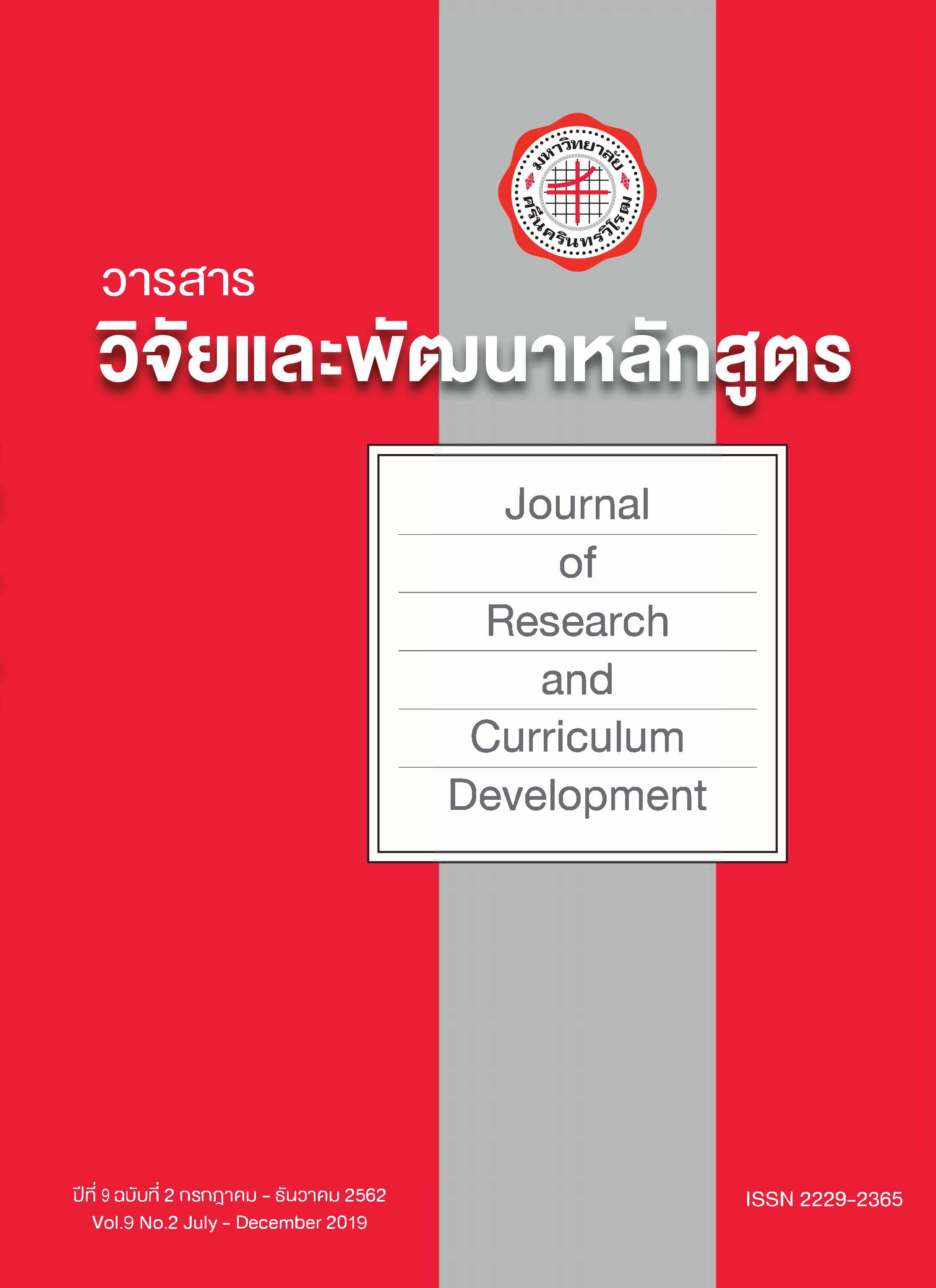การศึกษาสภาพการเรียนการสอนคณิตศาสตร์ที่เกี่ยวข้องกับ การแก้ปัญหาอย่างสร้างสรรค์ทางเรขาคณิต ระดับมัธยมศึกษาตอนต้น
Keywords:
The status of mathematics instruction, Creative problem solving on geometry Belief related to geometric creative problem solvingAbstract
The purpose of this study was to study the status of mathematics instruction related to geometric creative problem solving for students and teachers in the enrichment science classroom for lower secondary level. The study aimed at (1) the belief related to geometric creative problem solving for students and teachers, (2) the ability of creative problem solving on geometry for students and (3) the status of teaching and learning for teachers. The sample consisted of 18 Mathayomsuksa III students at during second semester of 2560 the academic year and 6 teachers from the Demonstration School of Ramkharmheang University and Srinakharinwirot University; Prasarnmit Demonstration School (Secondary). They were selected by purposive sampling method.
The result of this study (1) the belief related to geometric creative problem solving for students and teachers was good. (2) When students were provided to solve given problems, they had no a fluency in finding a variety of solutions. They had only one solution. Additionally, the students had no a flexibility for grouping the solutions and writing a rule clearly. Their grouping rule was not clear. Furthermore, the students had no an originality and elaboration for creating a new situation, which has a variety of solutions. (3) The teachers had no more understanding and experience in designing a teaching style, enhancing their students’ creative problem solving ability. They used a lecture method in the enrichment science classroom, and not provided their students any activity of creative problem solving or other mathematical processes.
References
ชุติมา คำธะนี. (2551). อิทธิพลของความเชื่อทางคณิตศาสตร์ของครูที่มีต่อการจัดกิจกรรมการเรียนรู้ในชั้นเรียนคณิตศาสตร์ระดับมัธยมศึกษา. วารสารศึกษาศาสตร์ มหาวิทยาลัยของแก่น. 2 (ฉบับพิเศษ). 40-49.
ไพฑูรย์ สินลารัตน์; และคณะ. (2558). ศาสตร์การคิดรวมบทความเรื่องการคิดและการสอนคิด. กรุงเทพฯ. สำนักพิมพ์มหาวิทยาลัยธุรกิจบัณฑิตย์.
สถาบันส่งเสริมการสอนวิทยาศาสตร์และเทคโนโลยี (สสวท). (2555). ครูคณิตศาสตร์มืออาชีพ เส้นทางสู่ความสำเร็จ. กรุงเทพฯ: บริษัท 3 คิวมีเดีย จำกัด.
สิริวรรณ จันทร์กูล. (2554). การสังเคราะห์วิทยานิพนธ์ทางการศึกษาคณิตศาสตร์ที่เกี่ยวข้องกับทักษะและกระบวนการทางคณิตศาสตร์ (วิทยานิพนธ์ครุศาสตรมหาบัณฑิต). กรุงเทพฯ: จุฬาลงกรณ์มหาวิทยาลัย.
สำนักงานคณะกรรมการการศึกษาแห่งชาติ. (2553). พระราชบัญญัติการศึกษาแห่งชาติ พ.ศ. 2542 แก้ไขเพิ่มเติม ฉบับที่ 2 พ.ศ. 2545 และฉบับที่ 3 พ.ศ. 2553. สำเนา.
สำนักงานรับรองมาตรฐานและประเมินคุณภาพการศึกษา. (2557). ผลการสังเคราะห์ผลการประเมินคุณภาพภายนอกระดับการศึกษาปฐมวัยและการศึกษาขั้นพื้นฐานรอบสอง (พ.ศ. 2549 -2553). สืบค้นเมื่อวันที่ 22 พฤษภาคม 2560. จากhttp://www.onesqa.or.th/th/contentlist-view/934/284/
อารีย์ คงสวัสดิ์. (2544). การศึกษาความสัมพันธ์ระหว่างความเชื่อในการเรียนคณิตศาสตร์กับผลสัมฤทธิ์ทางการเรียนวิชาคณิตศาสตร์ของนักเรียนชั้นมัธยมศึกษาปีที่ 3 (ปริญญานิพนธ์การศึกษามหาบัณฑิต). กรุงเทพฯ: มหาวิทยาลัยศรีนครินทรวิโรฒ.
อารี พันธ์มณี. (2547). คิดอย่างสร้างสรรค์ (พิมพ์ครั้งที่ 3). กรุงเทพฯ: ต้นอ้อ แกรมมี่ จำกัด.
Guilford, J.P. (1967). The Nature of Human Intelligence. New York: McGraw-Hill.
Krulik, Stephen; & Rudnick, Jesse A. (1999). Innovative tasks to improve critical and creative thinking skill. In Lee V. Stiff & Frances R. Curcio (Eds.) Development Mathematics Reasoning in Grade K–12: 1999 Yearbook. Reston, Virginia: National Council of Teachers of Mathematics.
National Council of Teacher of Mathematics. (2000). Principles and Standards for School Mathematics. Reston, Virginia: National Council of Teacher of Mathematics.
Rungfa Janjaruporn. (2005). The Development of a Problem-Solving Instructional Program to Develop Preservice Teachers’ Competence in Solving Mathematical Problems and Their Beliefs Related to Problem Solving. Bangkok: Graduate School, Srinakharinwirot University.
Torrance, E.P. (1962). Guiding Creative Talent. Englewood Cliffs, N.J.: Princeton Hall.





